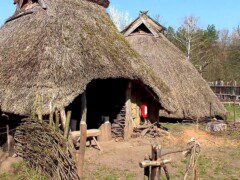Museumsdorf Duppel
Description:
The museum village of Düppel (Museumsdorf Düppel) covers an area of approximately 12 hectares and presents the reconstruction of a medieval village with houses, warehouses, craft shops, fountains, fields and gardens. The houses are supported on piles and are placed on the perimeter of a 1967th century settlement, unearthed in 30. The village was inhabited for a period of around XNUMX years, after which the settlers moved out.
This museum is also an experimental archeology center that explores the way of life in a medieval village and revives the breeding of forgotten domestic animal breeds to keep them as sources. Triennial crop rotation is practiced here, both wild and cultivated ancient plants are cultivated and threatened breeds of domestic animals are preserved from extinction. Little by little, but always using medieval techniques, new buildings and warehouses are built.
This open-air museum, established in 1975, is open to visitors from Easter until early October. On certain Sundays or on special public holidays, the members of the association supporting the museum organize guided tours to present the handicraft techniques of pottery, weaving, basket-weaving and tar-making. In addition, the village-museum invites walks, guided tours (also for classes), children's parties and markets.
Guided tours: si
Educational services: Educational workshops, also for children, animations, seminars.
Other services: Organization of courses on: agricultural, food and tools production.
Useful Information
(updated info on the ecomuseum website)
summer 2023
18. March 2023 – 5. November 2023
- Monday-Friday Closed
- Saturday-Sunday 10:00 – 18:00
The Düppel Museum Village is operated seasonally and is closed to the public during the winter months. It will reopen on March 18, 2023.
Open every day during school holidays.
Offers bookable all year round.
Easter holidays
1. April 2023 – 16. April 2023
- Monday-Sunday 10:00 – 18:00
Website: https://www.museumsportal-berlin.de/en/museums/museumsdorf-duppel-stadtmuseum-berlin/
Other information:
T he Viroin Valley, a tributary of the Meuse, is a rural area not far from the French border, in the Wallonie region. Here the forest has been the basis of local economic life for centuries and still today enriches the landscape. The small villages of the valley, including Treignes, the main seat of the ecomuseum, are
among the best preserved in the region. The valley is also crossed by a vintage steam train, a tourist attraction which allows for a pleasant discovery of the area.
Text source: ecomuseum website and volume: Ecomuseums – European Guide by Mairizio Maggi (in collaboration with Ires and the Piedmont Region)
CEIPEM PROJECT: Heritage Interpretation Experience Centres, Ecomuseums and Museums
For detailed information on the procedures for entering, modifying, deleting and classifying structures, see the reference page:
CEIPEM Project: Heritage Interpretation Experience Centers, Ecomuseums and Museums



